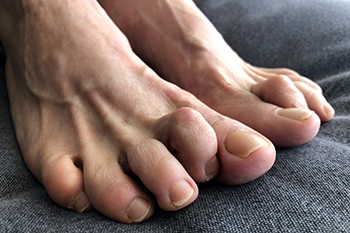
Hammer toes are a common foot deformity where one or more toes bend abnormally at the middle joint, resembling a hammer. Symptoms include pain, corns, and calluses due to friction against shoes. Preventing hammer toes involves wearing shoes with roomy toe boxes, avoiding high heels, and regularly stretching toes and feet. Treatment options vary based on severity, ranging from padding and orthotic inserts to alleviate discomfort to exercises and splinting to straighten the toe. In advanced cases, surgery may be necessary to correct the toe's position. A podiatrist can provide a comprehensive assessment, recommend appropriate treatments, and offer personalized advice to manage symptoms and prevent progression. Early intervention can improve comfort and prevent the need for more invasive treatments down the road. If you notice persistent toe pain, stiffness, or changes in toe shape, it is suggested that you make an appointment with a podiatrist.
Hammertoe
Hammertoes can be a painful condition to live with. For more information, contact one of our podiatrists from ABC Podiatry. Our doctors will answer any of your foot- and ankle-related questions.
Hammertoe is a foot deformity that affects the joints of the second, third, fourth, or fifth toes of your feet. It is a painful foot condition in which these toes curl and arch up, which can often lead to pain when wearing footwear.
Symptoms
- Pain in the affected toes
- Development of corns or calluses due to friction
- Inflammation
- Redness
- Contracture of the toes
Causes
Genetics – People who are genetically predisposed to hammertoe are often more susceptible
Arthritis – Because arthritis affects the joints in your toes, further deformities stemming from arthritis can occur
Trauma – Direct trauma to the toes could potentially lead to hammertoe
Ill-fitting shoes – Undue pressure on the front of the toes from ill-fitting shoes can potentially lead to the development of hammertoe
Treatment
Orthotics – Custom made inserts can be used to help relieve pressure placed on the toes and therefore relieve some of the pain associated with it
Medications – Oral medications such as anti-inflammatories or NSAIDs could be used to treat the pain and inflammation hammertoes causes. Injections of corticosteroids are also sometimes used
Surgery – In more severe cases where the hammertoes have become more rigid, foot surgery is a potential option
If you have any questions please contact our office located in Columbus, OH . We offer the newest diagnostic and treatment technologies for all your foot and ankle needs.




